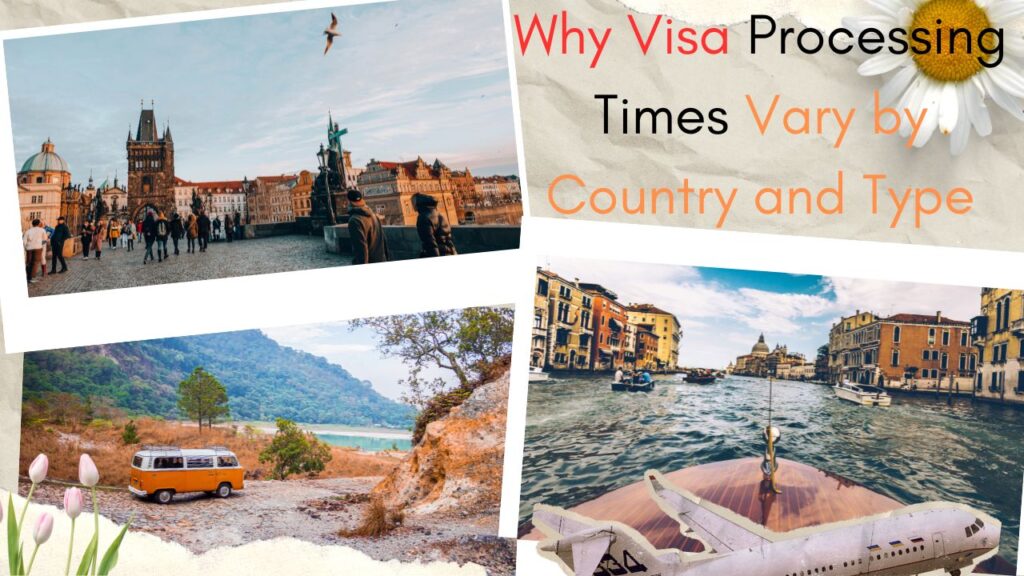
One important factor that is frequently disregarded while making trip plans abroad is the visa application procedure. Some visas can be granted in a matter of days, but others may take weeks or even months. Travelers can improve their planning and save stress at the last minute by knowing why visa processing times differ by nation and kind. Let’s investigate the variables that affect these differences.
1. Type of Visa Applied For
The kind of visa you apply for has a big impact on how long it takes. Due to less complicated procedures, tourist visas are frequently processed more quickly than work, business, or student visas. For instance:
Tourist visas are usually approved more quickly since they require less paperwork and background checks.
Work or student visas: they can take a long time to process because they need a lot of checks, such as verification from the employer or school.
Because family or spouse visas require extensive evidence demonstrating relationships, they may take longer to process.
2. Country of Destination
Every nation has different visa requirements and processing schedules depending on its administrative capacity, demand, and security measures. For instance:
Developed Nations: Due to their strict background investigations, nations like the USA, UK, and Canada frequently process visas more slowly.
Schengen Countries: Although the Schengen visa grants entry into a number of European nations, processing times vary by the nation you apply via, with some requiring less time than others.
New Travel Destinations: These nations may have expedited procedures to draw tourists, which has led to quicker approvals.
3. Application Volume and Seasonality
The volume of applicants has a major impact on visa processing times.
Peak Seasons: Emassies and consulates receive a spike in applications during holidays or significant world events, which causes processing delays to increase.
Off-Peak Seasons: You may receive approvals more quickly if you apply during off-peak hours.
4. Applicant’s Nationality
The intricacy of the visa application procedure is frequently determined by the applicant’s nationality. Processing delays may be impacted by diplomatically based reciprocal visa rules between nations:
Visa-Free Agreements: Citizens of nations with close diplomatic relations may be eligible for expedited processing or perhaps be excluded from the need for a visa.
High-Risk Countries: Applications from nations with political unrest or security issues might be subject to extra scrutiny, which could lead to delays.
5. Accuracy of the Application
Applications that are erroneous or incomplete can cause processing times to be greatly prolonged. Typical problems include.
missing records.
Incorrectly filled forms.
not responding to requests for more information.
Ensuring your application is complete and accurate can save valuable time.
6. Background Checks and Security Measures
Security and background checks are frequently required for visa applications in order to verify the applicant’s legitimacy. These inspections could be prolonged by the following factors:
Past trip experiences.
Criminal histories.
Verification of educational or employment history.
It can take longer for nations with more stringent security measures to finish these inspections.
7. Efficiency of the Consulate or Embassy
Another important consideration is the consulate or embassy’s administrative effectiveness in processing your application. While technologically advanced consulates may process applications more quickly, high-demand countries with limited staff and resources may experience backlogs.
8. Additional Interviews or Medical Examinations
The processing period for certain visa types may be prolonged by the need for applicants to go through medical exams or interviews. For instance:
Interviews are frequently necessary for work visas in order to verify employment offers and qualifications.
Medical examinations are necessary for residence or long-term permits.
9. Political or Economic Factors
Events that occur globally, including pandemics, political unrest, or economic crises, may cause delays in the visa application process. For example.
Due to staffing shortages and embassy closures, many nations experienced major delays during the COVID-19 epidemic.
Stricter examination and longer processing periods can also result from political conflicts between nations.
How to Minimize Delays
The following advice can help you prevent needless delays in the processing of your visa:
Apply Early: To allow for possible delays, submit your application well in advance of the date of your trip.
Double-Check Documentation: Verify that all necessary paperwork is present and correctly filled out.
Follow Instructions: Comply with the embassy’s or consulate’s application instructions.
Think About Expert Help: To expedite the procedure and steer clear of typical blunders, go with a reputable visa service provider.
Track Your Application: To keep tabs on the progress of your application, use online tracking tools when they are available.
Final Thought
Patience and preparation are key when dealing with visa applications. Every country’s process is unique, but with careful planning and adherence to guidelines, you can navigate the complexities and make your travel plans a reality without unnecessary stress.
